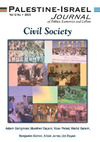That said, the registration of parties does not yet figure high on the list of priorities towards the achievement of reforms, as the main concern of the Palestinians remains the Israeli occupation and its direct impact on their life. Even the Palestinian factions themselves have expressed certain reservations regarding the issue of registration. In 1997, the Council of Ministers presented to the Palestinian Legislative Council (PLC) a draft law proposal for the registration of political parties. Although the PLC did approve the general reading of the law, there was no follow-up and the whole issue was relegated to the backburners.
A Controversial Issue
As mentioned earlier, the political party law is a controversial issue and lacks consensus among Palestinians. At present, the Palestinians hold two divergent outlooks regarding the role of the political movements. One view holds that the political movements should focus on their national role until the Palestinian independent state is established. The other contends that it is time for political movements to have a social participatory role as part of Palestinian civil society. The latter view assumes that the registration of Palestinian political parties constitutes an element of a state, following the models of some other countries. In any case, the idea has generated a heated debate within Palestinian society at large and among the political factions themselves. Currently, the political movements are subject to the basic law of elections, but, to date, no specific law exists pertaining to the political parties.
Ammar Dweik, chief electoral officer of the Central Elections Commission, sees a reason for the PLC abandoning the political parties draft law
"The Israeli occupation and the absence of real Palestinian sovereignty, which results in fear and concern on the part of the forces and factions to work in the framework of a political party, because this entails many commitments dealing with public membership and revealing the funding resources and other matters."(1)

A doctor in a Palestinian NGO helping children
The implication here is that it is mainly the political situation that is an impediment to the efforts of those Palestinians who advocate the registration of political parties. As for the institutions and organizations of Palestinian civil society, they seem to have a similar political role as the Palestinian factions of which they are extensions. Indeed, a look at the history of Palestinian civil society will show a noticeable influence of the macro-level political changes in the agenda of those organizations and institutions. According to Rema Hammami (2) and Manuel Hassassian, (3) Palestinian grass-roots efforts in the pre-Oslo era were more political and ideological, following the lines of the different political factions, and their main aim was to resist the Israeli occupation. In the aftermath of Oslo, dialogue became institutionalized mainly through non-governmental organizations (NGOs). The shift occurred basically as a result of a general change in the role and the form of Palestinian civil society in the wake of the arrival of the Palestinian National Authority (PNA).(4)
Grass-Roots Activities
Therefore, all the activities of these political parties and their representative committees had been designed to lead grass-roots efforts towards ending the protracted occupation. Following the 1967 war, Palestinians under Israeli occupation lacked basic services such as health, education, etc. Thus "...an emerging civil society was responsive to the social needs of the Palestinians in the absence of any political national authority in the 1970s-1980s and into the 1990s." (5) Many political/professional organizations were involved in the struggle against the Israeli occupation, through providing services to the Palestinian population. The Union of Palestinian Medical Relief Committee, for example, was established in 1979 with the purpose of providing health care to the Palestinian population, with its staff working on a totally voluntary basis. However, Hammami, who has a long-standing experience in Palestinian women's NGOs, found the problem with those organizations was their conflicting internal aims:
"This period [was] marked by contradictions within the organizations between their contending aims (grass-roots development versus political mobilization), within their leadership structures (party hierarchy versus professional staff versus community participation), and over their funding base (political versus donor money versus community support)."(6)
A Shift in Direction
When the intifada started in November 1987, all organizations were mostly concerned with resistance and the national agenda. Therefore, political factions and their existing organizations tended to coordinate their efforts and initiatives towards resisting and ending the Israeli occupation. In a study on Palestinian civil society, Muhammad Muslih explains how the Palestinian NGO functioned during the intifada:
Israel's heavy-handed practices, including measures of economic strangulation and the periodic withholding of basic services, had been felt so much by defenseless Palestinians that they continued to find in voluntary group action an attractive means to alleviate their suffering. But it was the Intifada that ensured that such action was a recognizable aspect of organizational life in the occupied territories. One unique feature of the Intifada was that it led to the creation of relatively autonomous and organized social units with specific functional responsibilities, foremost among which were serving the population and shielding it from the shattering impact of the Israeli military measures.(7)
However, from 1991 - at the time the peace process was in progress in Madrid - the Palestinian NGOs began to shift direction. As Hammami notes: "By 1991, many of these formerly popularly based grass-roots initiatives had become professionally based, foreign-funded development centers that targeted clients as opposed to working with a constituency."(8) The pre-Oslo Palestinian Non-Governmental Network (PNGO) was predicated on political activity and the mobilization of the population against the daily practices and unfair political measures imposed by Israel. The peace process obliged the Palestinian NGOs to rethink their methods, and professionalism replaced their explicitly partisan frameworks.
Political Parties, Civil Society
The PNA and the election of the PLC in 1996 have had an impact on the role of the Palestinian political factions. The political parties which opposed the Oslo agreement remained outside the Palestinian system and were not represented in the PLC, and meanwhile lost their grass-root support among Palestinian society. It was the Fateh movement which became the ruling and all-powerful party.
At present, Palestinian society is struggling to end the new form of Israeli occupation and to build a civil society that can guarantee human rights and social security. The issues related to social and civil society, which were always being postponed by the political groups and factions prior to the Oslo agreement, are once again being raised and brought forward for public debate. Palestinian society now finds itself struggling for dual rights: national and civil.
The Party Law - Conflicting Views
The Palestinian party law, as part of Palestinian civil and human rights, might play a significant role in achieving democracy, stability and security for the Palestinians. As George Giacaman puts it:
Without constitutional and legal guarantees, but more importantly, without the separation of powers, independence of the judiciary, rule of law, accountability and rotation in government, any expansion in the sphere of civil society will remain vulnerable.(9)
Ibrahim Khraishi, member of the PLO Central Committee, who seems to think along similar lines and who favors party registration, explained in an interview that:
"The registration law of the political parties will create a proper partisan life for each party. Each party will be obliged to have a clear political platform and hold elections. This will guarantee the democratic performance of each party through internal elections. Consequently, this will have an impact on the Palestinian civil society. Those political parties will help in institutionalizing the organizations of the civil society through their representations in the municipalities and the PLC."(10)
Member of the PLC, Mohammed Hourani, on the other hand, seems to hold a different view. In an interview he told this writer:
At the present time, party registration is not urgent because the political factions still have national goals that they need to accomplish. We have the basic election law and every Palestinian has the right to participate in the elections. At the end, the elections will produce the political parties. This is enough for the time being.(11)
Moreover, two divergent views also exist regarding the opposition groups with relation to party registration. Hourani sees that
"Party registration might be problematic for the opposition national groups. Such groups do not agree with the Oslo agreement and do not wish to be part of the resulting system. As long as our national goals are not yet attained, the position of the opposing factions should be considered"(12)
Khraishi, on the other hand, disagrees with this view and believes that the registration of the opposition factions is a positive factor:
Opposition factions can be more active when they are registered. Political parties are one of the most important elements of civil society. Therefore, political parties should be subject to laws and legislations to achieve democracy. Party registration will help in presenting clear political platforms and more defined programs. In this case, the internal matters of each party will be better organized to guarantee legality. Palestinian elections then will be based on the political platforms rather than tribal and kinship. Consequently, funding will have to be attained through activities and community work.(13)
Concluding Remarks
At present, no legislation has been issued by the PLC as a separate article regarding the political parties. Instead, the registration of political parties is embedded within the elections law of 1995. The law of elections pertaining to political parties is largely procedural. Parties are required to register at the Ministry of the Interior without any conditions expect the completion of an application request. No other requirements are made regarding constitution or source of funding.
In general, the fact that the law of party registration has not been issued yet means that political factions will remain outside any legal framework. The conclusion whether the law of party registration is beneficial or not will require more Palestinian efforts and research. One thing is certain though, the absence of a law in relation to Palestinian factions has its disadvantages. As an example, the Central Election Commission is unable to find the means to audit the financial resources of the Palestinian factions that have participated in the elections.(14) At the same time, the Israeli occupation will remain the main obstacle in the way of any progress in the issue of party registration as well as an impediment to a Palestinian consensus on the matter.
At present, the whole issue of party registration is not subject to any public debate, either by those in favor or by those opposed. Nevertheless, Palestinians concerned with the provision of a legal framework for the political parties should step forward and raise the issue within Palestinian civil society and its organizations.
Endnotes
1. Ammar Dweik (2005), The Legal Framework of Political Parties Registration in Palestine: A
General Overview in Light of the Election Experience, www.passia.org (accessed
April 19, 2005).
2. Rema Hammami (1995), "NGOs: The Professionalization of Politics," Race and Class, 37:2 p. 55.
3. Manuel Hassassian (2000), "The Role of Palestinian NGOs in Peace-Building and Conflict Resolution," in Sami Adwan and Dan Bar-On, eds., The Role of Non-Governmental Organizations in Peace-Building Between Palestinians and Israelis, Beit Jala, PRIME Publications, p. 25.
4. Jamil Hilal (1998), "The Effect of the Oslo Agreement on the Palestinian Political System," in George Giacaman and Dag J?rund, Eds., After Oslo: New Realities, Old Problems, London: Pluto Press, p. 255.
5. Hassassian, p. 26.
6. Hammami, p. 55.
7. Muhammad Muslih (1995), "Palestinian Civil Society," in Augustus Richard Norton, ed., Civil Society in the Middle East (Vol. I), Leiden and New York: Brill, p. 255.
8. Hammami, p. 55.
9. George Giacaman (1998), "In the Throes of Oslo: Palestinian Society, Civil Society and the Future," in George Giacaman and Dag J?rund, After Oslo: New Realities, Old Problems, London: Pluto Press, p. 13.
10. Ibrahim Khraishi, interview, April 21, 2005, Ramallah.
11. Mohammed Hourani, interview, April 5, 2005, Ramallah.
12. Ibid.
13. Khraishi.
14. Dweik, op. cit.

